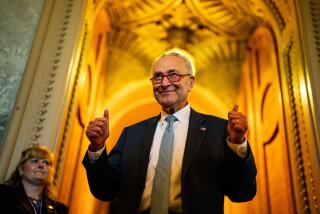Bill Proposes $1.50-a-Pack Cigarette Tax
- Share via
In the first major legislation spawned by the proposed tobacco deal, a bill was introduced in Congress on Wednesday to raise the federal tax on cigarettes by $1.50 a pack to discourage smoking--but without providing legal protections sought by the tobacco industry.
The proposal by Sen. Frank R. Lautenberg (D-N.J.) and Rep. James V. Hansen (R-Utah) would raise the cigarette excise tax by 50 cents per pack for three consecutive years, with automatic annual future increases equal to 3% or the rise in the consumer price index, whichever is more.
The windfall produced by the tax increase, estimated at nearly $20 billion a year, would be earmarked for anti-tobacco advertising and smoking-cessation programs, and for financial assistance for farmers and rural communities affected by lower demand for tobacco crops. The federal government would get 25% and the states 75% of the money raised for these and other health programs.
But more significantly, the proposal would give cigarette makers no relief from lawsuits, which was their reason for seeking a truce with legal foes in the first place. As a result, the measure got an enthusiastic reception from health and anti-smoking groups, which have grown increasingly uneasy about concessions contained in the tobacco deal announced in June.
But the absence of benefits for the industry also means the bill has little chance to pass as written, because the industry--despite its waning strength--still pulls enough weight in Congress to tie up adverse legislation.
“We’re not saying at this point whether we mind it being amended,” said Brian Williams, a Hansen aide. “At this point, this bill could very well be the foundation for a settlement.”
Scott Williams, a spokesman for the industry, said cigarette makers will oppose measures that seek to implement parts of the tobacco deal. He said the June 20 accord, negotiated among the industry, state attorneys general and private anti-tobacco lawyers, “offers the best way to address all the issues comprehensively.”
The bill will not be the last vehicle for implementing a tobacco settlement. Orrin G. Hatch (R-Utah), chairman of the Senate Judiciary Committee, said Wednesday that he hopes to introduce comprehensive legislation within the next two weeks. And Sen. Edward M. Kennedy (D-Mass.) may also offer a bill before Congress adjourns next month.
The Lautenberg-Hansen bill would raise the price of peace beyond the $368.5 billion the industry has agreed to pay over the next 25 years.
The sponsors estimate that the tax increase would bring in at least $494 billion over 25 years--an amount that assumes hefty reductions in cigarette consumption because of the higher price. President Clinton last month called for cigarette prices to rise by as much as $1.50 a pack to discourage smoking by teenagers, but he spoke of phasing in such an increase over 10 years.
Supporters of the bill, including the American Cancer Society and the American Medical, Heart and Lung associations, noted that sharp price increases help reduce smoking by teenagers and other price-conscious consumers.
Lautenberg noted that an estimated 3,000 teenagers take up smoking each day. “You’re talking about huge numbers,” he said. “If we were able to cut 500 or 1,000 kids a day, we would be talking about 300,000 young people a year who would not smoke.”
In the accord proposed in June, cigarette makers agreed to halt billboard advertising and to accept other curbs on marketing. Those provisions are not included in the Lautenberg-Hansen bill.
Nor does it include the main thing the industry sought: a ban on lawsuits by states and class actions, and on punitive damage awards in cases brought by individual smokers.
Zeroing in on a side issue, three lawmakers separately have taken aim at the billions of dollars in legal fees private attorneys could collect if Congress ratifies the tobacco deal. A bill introduced last week by House members Christopher Cox (R-Newport Beach), Scott McInnis (R-Colorado) and Paul McHale (D-Pa.) would limit fees paid to attorneys involved in the June settlement to $150 per hour plus expenses.
Although the agreement had provided for tobacco companies to pay the legal fees without dipping into the $368.5 billion, Cox called the distinction a “legal fiction. . . . We prefer to spend the money on public health rather than excessive fees.”
Republicans in particular have tapped popular resentment of trial lawyers in critiquing the tobacco deal. Defenders of the lawyers’ role have called the attacks politically motivated--pointing out that trial lawyers give generously to the Democrats, just as tobacco companies give most of their money to the GOP.
More to Read
Get the L.A. Times Politics newsletter
Deeply reported insights into legislation, politics and policy from Sacramento, Washington and beyond. In your inbox twice per week.
You may occasionally receive promotional content from the Los Angeles Times.










